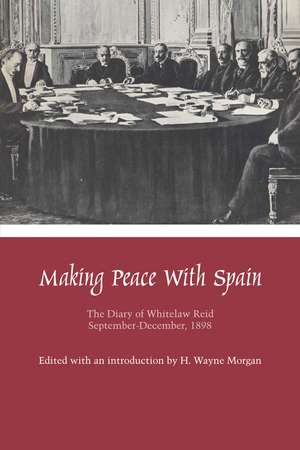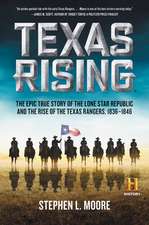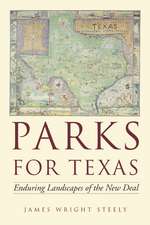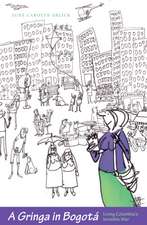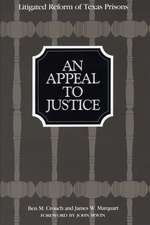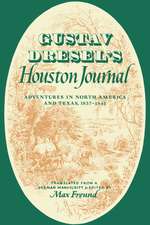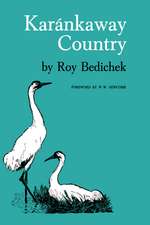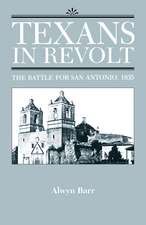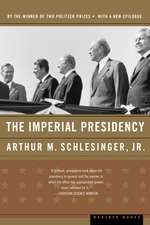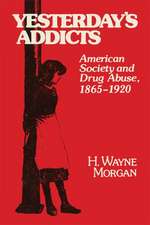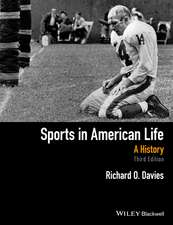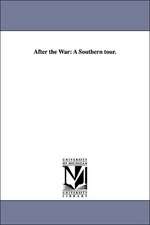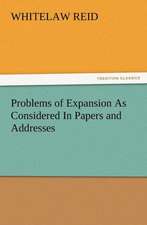Making Peace with Spain: The Diary of Whitelaw Reid, September-December, 1898
Autor Whitelaw Reid Editat de H. Wayne Morganen Limba Engleză Paperback – 1965
In editing Reid’s diary, Morgan used much material pertinent to the Paris Peace Conference of 1898, employed here for the first time. This material is a rich assortment of archival matter: the Reid Papers, the John Hay Papers, the John Bassett Moore Papers, and the McKinley Papers, in the Library of Congress; the Peace Commission records, in the National Archives; and unpublished materials in the Central Files of the Department of State.
Whitelaw Reid, as a war correspondent during the Civil War, as clerk of the House Military Affairs Committee, and later as a successor to Horace Greeley on the Tribune, gained access to the leaders of his times and insight into their actions. In 1889 he was appointed U.S. Minister to France by Harrison, and in 1892 he had the dubious honor of being chosen as Harrison’s running mate on the losing presidential ticket. An influential friend and supporter of President McKinley and an occasional advisor to him, Reid was no stranger to politics and to international diplomacy when McKinley appointed him to the Peace Commission that wrote the treaty concluding the Spanish-American War. As a matter of fact, Reid’s opinion reflected the administration’s attitude of expansionism, the policy of Manifest Destiny—or “imperialism,” as it was later called.
Reid’s diary records the details of the sessions of the Joint Peace Commission of Paris from September through a large part of December of 1898. His day-by-day entries reveal the complexity of issues to be considered, the tactics of both the Spanish and the American Commissions in attempting to gain advantage for their respective governments, the interplay of the personalities of the once-proud Spaniards and the brash Americans, the political objectives influencing the points of view of the various members, and the maneuverings that brought about the final resolution of debated issues.
Preț: 240.05 lei
Nou
Puncte Express: 360
Preț estimativ în valută:
45.93€ • 48.09$ • 38.01£
45.93€ • 48.09$ • 38.01£
Carte tipărită la comandă
Livrare economică 07-21 aprilie
Preluare comenzi: 021 569.72.76
Specificații
ISBN-13: 9780292769229
ISBN-10: 0292769229
Pagini: 304
Dimensiuni: 152 x 229 x 21 mm
Greutate: 0.45 kg
Editura: University of Texas Press
Colecția University of Texas Press
ISBN-10: 0292769229
Pagini: 304
Dimensiuni: 152 x 229 x 21 mm
Greutate: 0.45 kg
Editura: University of Texas Press
Colecția University of Texas Press
Notă biografică
H. Wayne Morgan (1934–2014) was George Lynn Cross Research Professor of History at the University of Oklahoma.
Cuprins
- Editorial Note
- Introducing Mr. Reid
- The Diary
- I. Organizing the Conference: Problems and Persons
- II. Organizing for Diplomacy
- III. Making Calls and Taking Testimony
- IV. Threats of Rupture: The Problem of the Cuban Debt
- V. Taking the Philippines
- VI. Finishing the Treaty
- Appendixes
- I. The Armistice Protocol of August 12, 1898
- II. President McKinley’s Instructions to the Peace Commission, September 16, 1898
- III. Opinions of the Peace Commissioners on the Retention of the Philippines, October 25, 1898
- IV. Biographical Glossary
- Index
Descriere
Reid’s diary records the details of the sessions of the Joint Peace Commission of Paris from September through a large part of December of 1898.
